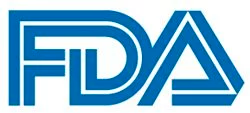News
Article
FDA Grants Fast Track Designation to PT217 for Extensive Stage Small Cell Lung Cancer
Author(s):
The FDA has granted fast track designation to PT217 for patients with extensive stage small cell lung cancer with disease progression.
FDA

The FDA has granted fast track designation to PT217 for the treatment of patients with extensive stage small cell lung cancer (ES-SCLC) with disease progression following platinum-based chemotherapy with or without a checkpoint inhibitor.1
“PT217 has the potential to be a transformative treatment option for patients with SCLC, large cell neuroendocrine carcinoma [LC-NEC] and extrapulmonary NECs [EP-NECs] in various settings,” Ming Wang, PhD, MBA, founder and CEO of Phanes Therapeutics, said in a press release. “Now we have two fast track designations in our pipeline. Last month, PT886 was granted fast track designation for the treatment of patients with metastatic claudin 18.2-positive pancreatic adenocarcinoma. Both assets are from our optimized anti-CD47 bispecific antibody franchise and currently in clinical studies. We believe the optimized anti-CD47 bispecific antibody approach can unlock the full potential of the innate immunity in targeting solid tumors.”
PT217 is a first-in-class native IgG-like bispecific antibody directed toward DLL3 and CD47 currently under evaluation in the phase 1 SKYBRIDGE trial (NCT05652686) for the treatment of patients with SCLC, LC-NEC, and EP-NEC.1,2
Due to its mechanism PT217 is designed to kill tumor cells through the antibody-dependent cellular phagocytosis activity of macrophages and antibody-dependent cell cytotoxicity activity of NK cells. With dual targeting of DLL3 and CD47, which are expressed on the surface of cancer cells, it can heighten potential antitumor activity. Additionally, PT217 is thought to elicit tumor neoantigens by channeling tumor cells into phagocytotic antigen presenting cells and stimulate the adaptive immune system by indirectly activating T-cell–mediated death of DLL3-expressing tumor cells through recognition of tumor neoantigens.4
In June 2022, the agent received orphan drug designation from the FDA for patients with SCLC.3
On September 7, 2023, Phanes announced that the first patient had been dosed in the phase 1 trial.4 SKYBRIDGE is an open-label, dose-escalation and dose-expansion study designed to evaluated PT217 in patients with advanced refractory cancers expressing DLL3.2 To be eligible for enrollment patients must be at least 18 years of age and have histologically or cytologically confirmed unresectable advanced or metastatic SCLC, LC-NEC, neuroendocrine prostate cancer, or gastroenteropancreatic NEC with disease progression and no standard of care or tolerable treatment options available.
Additional eligibility criteria require the ability to provide a formalin fixed, paraffin embedded tumor tissue sample for evaluation of DLL3 expression and other biomarkers. The biopsy must be excisional, incisional, or core needle. Fine needle aspiration won’t be accepted.
Patients with heterogeneous histology will be excluded from enrollment if the NEC or small tumor cells component of the disease doesn’t represent at least 50% of the overall tumor tissue.
In the dose-escalation phase 1 patient will be enrolled initially at each of the lower dose levels, beginning with 0.2 mg/kg every week, followed by 0.6 mg/kg and 2 mg/kg. Additional dose levels include 6 mg/kg and 12 mg/kg.
The dose-expansion phase will include two cohorts: cohort 1 will evaluate patients with SCLC at the recommended phase 2 dose (RP2D) and cohort 2 will evaluate patients with NEC at the RP2D excluding one dose level and not exceeding 5 patients that do have SCLC.
The primary objectives of the study include the determination of any dose-limiting toxicity, the maximum tolerated dose, the RP2D, and overall safety of PT217. Secondary objectives include measures of efficacy, which will be quantified by objective response rate and pharmacokinetics. The disease control rate will also be evaluated.
References
- Phanes Therapeutics’ PT217 granted fast track designation by the FDA. News release. Phanes Therapeutics. April 8, 2024. Accessed April 9, 2024. https://www.prnewswire.com/news-releases/phanes-therapeutics-pt217-granted-fast-track-designation-by-the-fda-302110778.html
- A phase 1 study of PT217 in patients with advanced refractory cancers expressing DLL3 (the SKYBRIDGE study). ClinicalTrials.gov. Updated January 29, 2029. https://clinicaltrials.gov/study/NCT05652686
- Phanes Therapeutics’ PT217 receives orphan drug designation for small cell lung cancer from the FDA. News release. Phanes Therapeutics. June 21, 2022. Accessed April 9, 2024. https://www.prnewswire.com/news-releases/phanes-therapeutics-pt217-receives-orphan-drug-designation-for-small-cell-lung-cancer-from-the-fda-301571447.html
- Phanes Therapeutics announces first patient dosed in phase 1 study of PT217 for small cell lung cancer and other neuroendocrine cancers expressing DLL3. News release. Phanes Therapeutics. September 7, 2023. Accessed April 9, 2024. https://www.prnewswire.com/news-releases/phanes-therapeutics-announces-first-patient-dosed-in-phase-1-study-of-pt217-for-small-cell-lung-cancer-and-other-neuroendocrine-cancers-expressing-dll3-301920004.html









